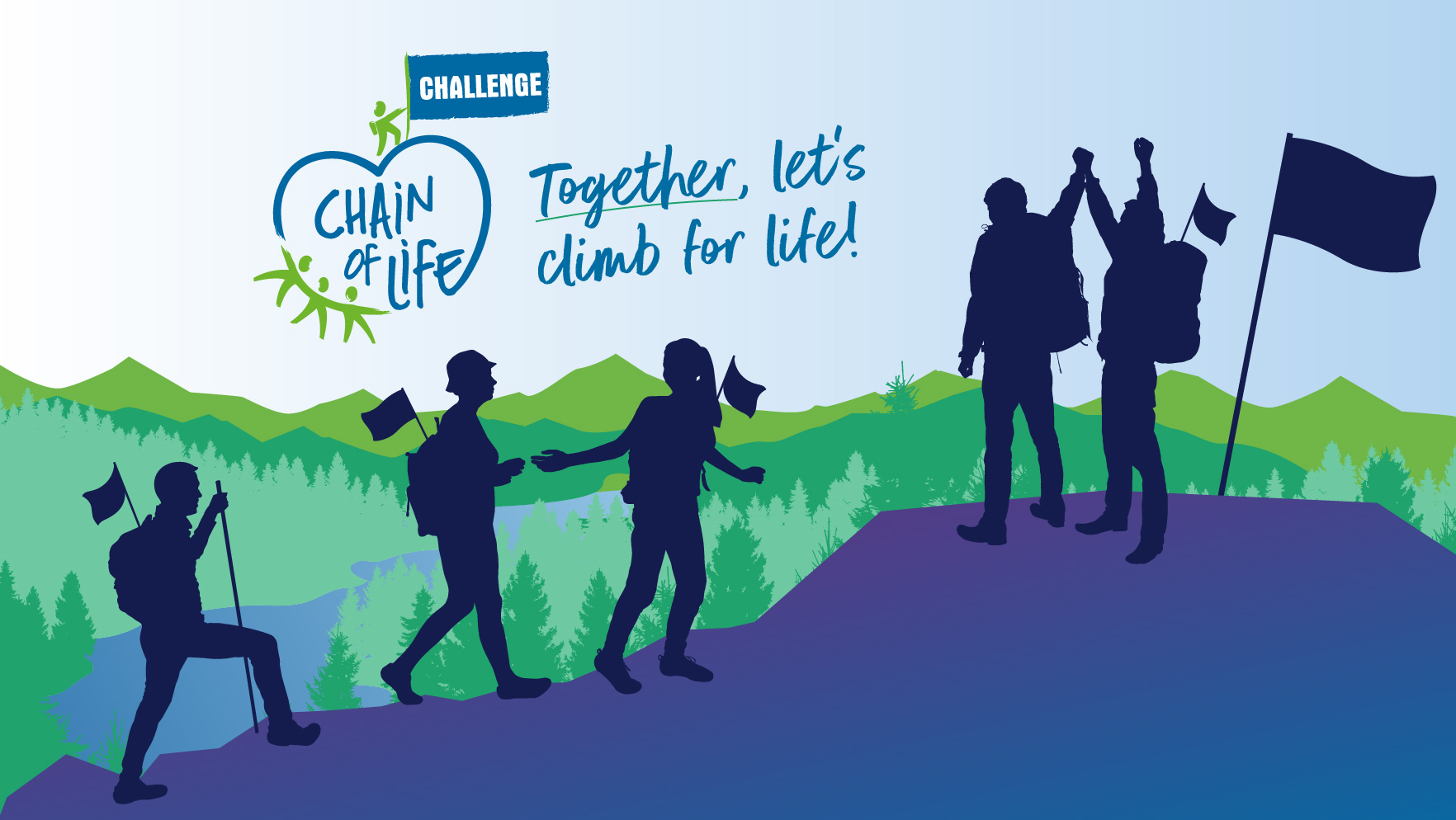
A Visually Impaired Student Inspires and Shares a Message of Hope
On October 5, Anna Lemay, a visually impaired student from Polyvalente de Saint-Jérôme,...
Read/View / Chain of Life Challenge

QUEBEC CITY, October 11, 2022 - In all regions of Quebec, living donors will climb 16 mountains as flag bearers for the Chain of Life Challenge in conjunction with the "World Day for Organ and Tissue Transplantation". They will carry out this act of solidarity to support organ and tissue donation education in schools. Living donors from elsewhere in Canada, the United States, France, and even Nepal, will also join the movement by proudly carrying the Chain of Life flag to the top of their respective mountains.
“We invite the general public, young and old alike, to join the flag bearer(s) in their region on October 15 or 16 and participate in this great event, the goal of which is to build a healthy society," says Isabelle Maréchal, co-patron of the Chain of Life Challenge. “These acts of kindness help support this great movement for organ and tissue donation education in schools while giving hope to those waiting for a transplant."
Kidney failure, which can be caused by various diseases or conditions such as diabetes, hypertension, heredity, infections or interactions between certain drugs, is the 10th cause of death in Canada , affecting one in ten people . Because there is no cure for kidney failure, many of these people eventually require a transplant. Of the 888 people currently on the waiting list for an organ in Quebec, 620 of them or 70%, are waiting for a kidney .
In 2020, 28% of kidney transplants were from living donors . Promoting living donation is a promising way to reduce the waiting list for a kidney, liver, and stem cell transplants. Whether it be for a loved one, a paired donation, or an undirected donation, living donation is an alternative that is increasingly sought after by the medical profession because many benefits, including a shorter waiting time for an organ and greater longevity, result from this selfless act. In Quebec in 2021, 75 people made a living donation, placing the province at the bottom of the list of living donations in Canada .
"For nearly 10 years, the Chain of Life program has been educating students aged 15 to 17 about the importance of organ and tissue donation by presenting its various issues in a responsible manner," explains Lucie Dumont, founding president of Chain of Life. “The program provides students with educational activities that help them develop an informed opinion about organ and tissue donation and then have a family discussion. By turning to the incredible power of young people as ambassadors and agents of change, we believe we can create a real culture of donation in Quebec society," concludes Ms. Dumont.
“Life can sometimes hang by a thread or on a few days, as in my case," says Thierry Houillon, co-patron of the Chain of Life Challenge and himself a liver transplant recipient. “Today, living donors have the superpower to save people in need of a new organ in order to stay alive. This is a very generous gesture. It’s important to have a conversation about organ donation. That’s what Chain of Life is all about.”
“Stem cell donors or living donors (of a kidney or lobe of a liver) deserve all our recognition and admiration for their gesture of great generosity,” said Jean-Pierre Léger, vice-president of the Fondation de la famille Léger, principal partner of the Chain of Life Challenge. “Thank you for highlighting this key link in the Chain of Life Challenge this year. I would also like to take this opportunity to thank all the Chain of Life teachers who educate our young people about organ and tissue donation—an educational mission that is very important to me!”
Chain of Life is a charitable organization that relies almost entirely on donations received through the Chain of Life Challenge in order to carry out its primary mission of educating young people about organ and tissue donation in secondary school. In doing this, it helps save lives. In addition, the Chain of Life program raises awareness about the inestimable value of having a healthy body and the extreme importance of adopting healthy lifestyle habits.
The Chain of Life program is currently being taught in approximately 100 schools in Quebec and nearly 100,000 young people have been reached by its message. Leading education and transplant specialists are involved in creating its content.
To sign up for the Chain of Life Challenge or to make a donation
Sophie Allard, ARP
Communications Director
Chain of Life
514 808-9474 ou sophieallard@chainedevie.org

On October 5, Anna Lemay, a visually impaired student from Polyvalente de Saint-Jérôme,...

Our great human chain came to life through 18 challenges, in Quebec and around the world, shining a...